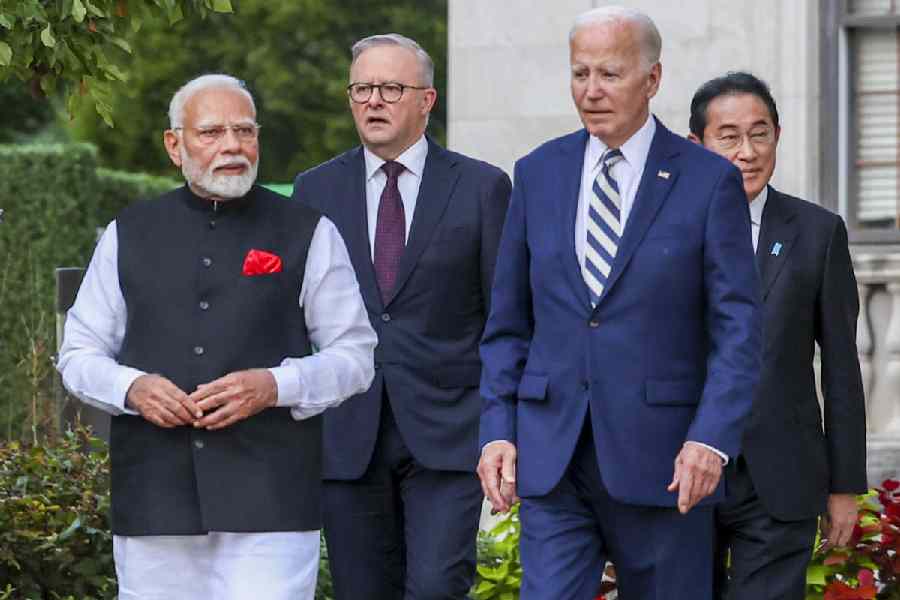The Quad leaders on Saturday decided to expand maritime cooperation in the Indo-Pacific with the announcement of a joint coast guard mission in 2025 while continuing to maintain that the Australia-India-Japan-US quadrilateral is not against any country.
“We are also announcing today that the US Coast Guard, Japan Coast Guard, Australian Border Force and the Indian Coast Guard plan to launch a first-ever Quad-at-Sea Ship Observer Mission in 2025, to improve interoperability and advance maritime safety, and continuing with further missions in future years across the Indo-Pacific,” the Wilmington Declaration issued at the end of the fourth in-person Quad summit in Delaware said.
This time, the summit was held in US President Joe Biden’s hometown of Wilmington where he also opened his home for his guests from India, Australia and Japan. Speaking on the significance of this gesture, US national security adviser Jake Sullivan told reporters ahead of the summit that it “is a way of him showing, not just saying, that these leaders matter to him, that the Quad matters to him as a significant foreign policy priority.
“And institutionalising and deepening and elevating the Quad has been one of the things that he’s going to be very proud of when he leaves office and passes the baton to the next President of the United States.”
As always, there was no mention of China in the detailed declaration but stronger than usual language was used by the leaders regarding the goings on in the South China Sea, an oblique reference to Beijing’s muscle-flexing in these waters.
“We are seriously concerned about the situation in the East and South China Seas. We continue to express our serious concern about the militarisation of disputed features, and coercive and intimidating manoeuvres in the South China Sea. We condemn the dangerous use of coast guard and maritime militia vessels, including increasing use of dangerous manoeuvres. We also oppose efforts to disrupt other countries’ offshore resource exploitation activities. We reaffirm that maritime disputes must be resolved peacefully and in accordance with international law, as reflected in UNCLOS (United Nations Convention on the Law of the Sea),” the declaration stated.
“We re-emphasise the importance of maintaining and upholding freedom of navigation and overflight, other lawful uses of the sea, and unimpeded commerce consistent with international law. We re-emphasise the universal and unified character of UNCLOS and reaffirm that UNCLOS sets out the legal framework within which all activities in the oceans and the seas must be carried out. We underscore that the 2016 Arbitral Award on the South China Sea is a significant milestone and the basis for peacefully resolving disputes between the parties,” it added.
All these references in the declaration essentially refer to China without naming the country even once. China has often frowned upon the Quad, viewing the grouping as an effort to encircle it and contain Beijing’s growing sphere of influence.
Asked about China stepping up its objections given the new security features being added to Quad cooperation, Sullivan said: “The thrust and purpose of the institution writ large and the security features of it are about a positive agenda to enhance security, not just for Quad countries but for other regional partners.
“So, it’s hard for me to see how and why the PRC should object to the four countries, for example, doing a coast guard mission together, or doing cyber trainings for Southeast Asia together, or taking steps with respect to maritime domain awareness. These do not, to me, indicate any form of aggression or assertive behaviour. They’re fundamentally constructive and positive, and that’s where we’re going to continue to position the Quad.”
At a post-summit briefing, Indian foreign secretary Vikram Misri sidestepped a similar question on the stronger language in the declaration vis-à-vis China. He also didn’t respond to a question on whether China’s aggressive moves in the South China Sea were discussed by Modi and Biden in their bilateral on the sidelines of the Quad summit.
Another key announcement from the Quad was the launch of a Quad Indo-Pacific Logistics Network pilot project to pursue shared airlift capacity among the four nations to leverage collective logistics strengths to support civilian response to natural disasters more rapidly and efficiently across the Indo-Pacific region.










